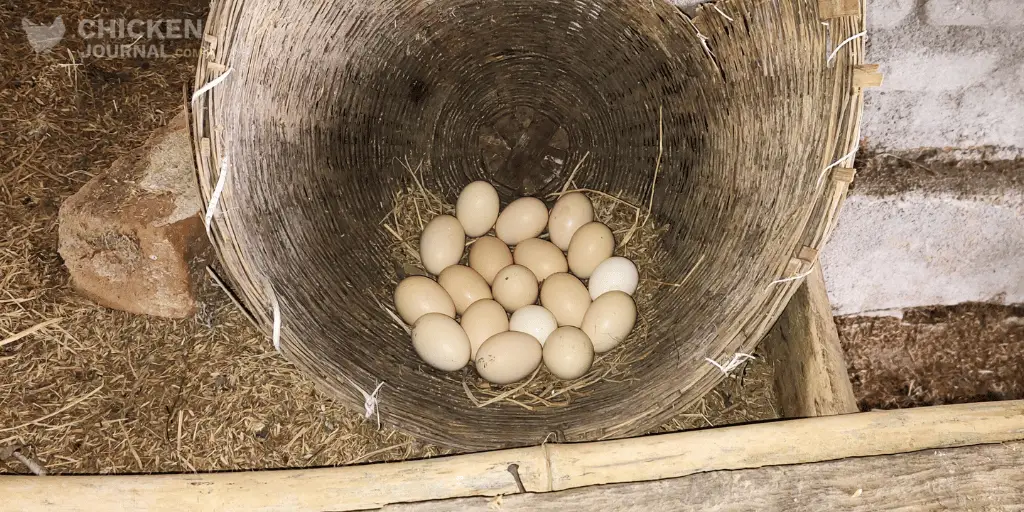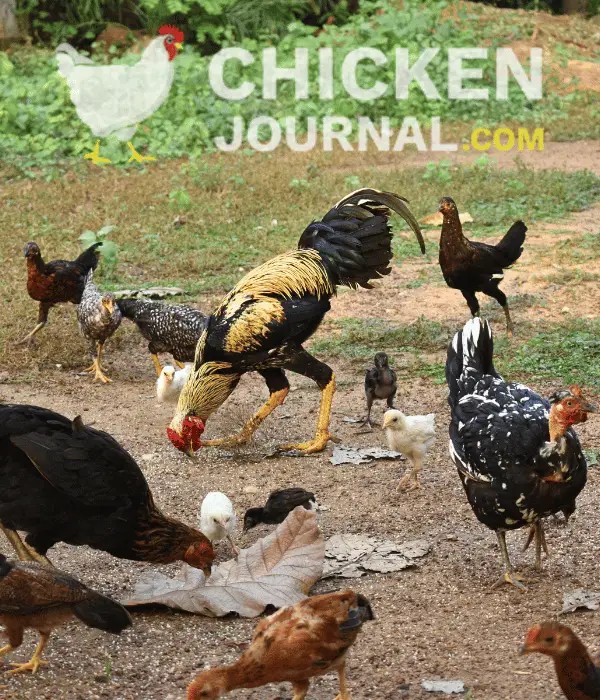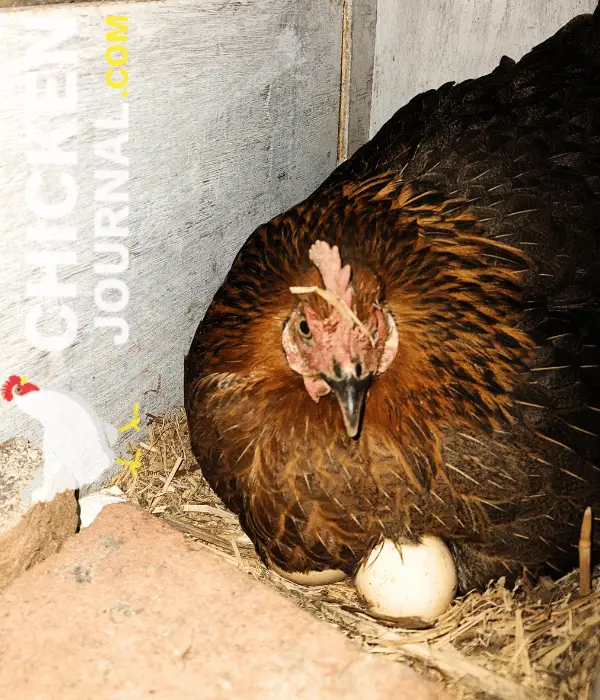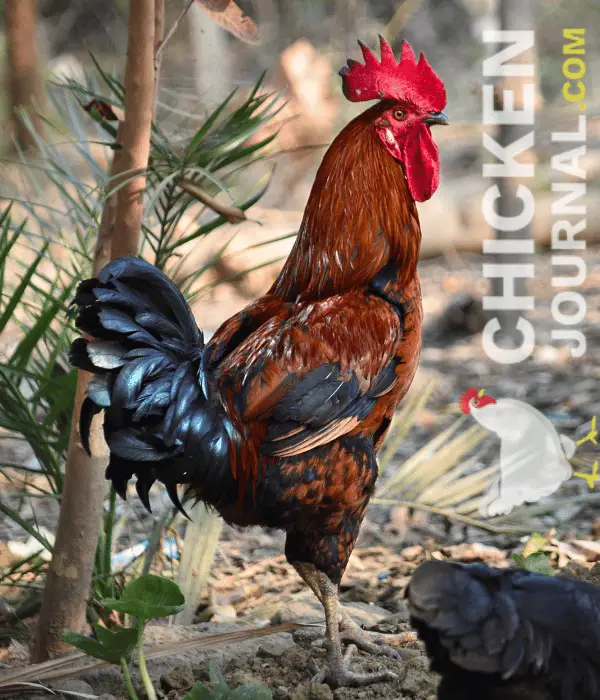
As a chicken owner, you’re always looking for ways to increase egg production in your chickens. Eggs are essential for a well-balanced diet and can be a good source of income.
Our comprehensive guide offers crucial tips and techniques to ensure your chickens produce eggs to their maximum potential. Discover the best strategies for optimizing egg production in your flock.
Before diving into the various tips and techniques to increase egg production in chickens, it’s essential to understand the factors that influence egg production.
Chickens are complex creatures, and their ability to lay eggs is affected by numerous factors, including nutrition, living conditions, health, stress levels, breeding techniques, artificial lighting, and seasonal changes.
Learn how to maintain a balanced diet, create a healthy living environment, manage stress, use effective breeding methods, handle artificial lighting and seasonal changes, and record common egg production issues in your chickens.
Importance of Proper Nutrition and Diet for Chickens Egg Production

Foods That Increase Egg Production in Chickens
A well-balanced diet is crucial for chickens to maximize their egg production. The primary nutrient for egg production is protein, which is essential for developing solid eggshells and healthy embryos.
Foods rich in protein include fish, soybean, and alfalfa. Other vital nutrients include vitamins A, D, and E, calcium, and phosphorus, which can be found in foods such as leafy greens, crushed oyster shells, and sunflower seeds.
Supplements and Herbs to Boost Egg Production
If you want to boost chicken egg production, adding supplements and herbs to your balanced diet can be helpful.
Some popular supplements include calcium supplements, vitamin D3 supplements, and poultry-specific multivitamins. These supplements can help ensure your chickens receive all the nutrients for optimal egg production.
Herbs like parsley, oregano, and garlic can boost egg production, prevent infections, and promote overall health.
The Role of Yogurt and Cayenne Pepper in Egg Production
Yogurt and cayenne pepper are two ingredients often touted as ways to increase egg production in chickens.
Yogurt promotes gut health, improving nutrient absorption and higher egg production.
On the other hand, Cayenne pepper is thought to boost blood circulation, which can help chickens stay warm in colder weather and maintain consistent egg production.
While some anecdotal evidence supports using yogurt and cayenne pepper to increase egg production, it’s essential to approach these methods cautiously, as excessive consumption can lead to health issues or imbalances in your chickens’ diet.
Optimal Living Conditions for Chickens
To ensure the maximum egg production from your chickens, it’s essential to create a comfortable and stress-free environment for them. Providing adequate space for your flock is crucial, as overcrowding can cause stress, ultimately decreasing egg production.
Providing a minimum of 3-4 square feet of area in the coop and 10 sq ft in the run per chicken is strongly recommended for optimal living conditions.
Temperature and ventilation also play a crucial role in maintaining optimal living conditions. Most chicken breeds prefer temperatures between 55-75°F (13-24°C), so it’s essential to ensure that your coop is adequately insulated and heated during colder months.
Proper ventilation is necessary for maintaining good air quality and preventing the buildup of ammonia and moisture, which can lead to respiratory issues and decreased egg production.
To encourage egg production, it’s vital to have clean and comfortable nesting boxes. To ensure your flock is comfortable, provide them with enough boxes. For every 3-4 hens, there should be one nesting box.
Use clean and soft bedding, such as straw or wood shavings. This promotes health and stress management, leading to better egg production.
Stress is a significant factor that can negatively impact egg production in chickens. Everyday stressors include sudden changes in temperature, overcrowding, predators, and illness.
Ensuring the comfort and calmness of your chickens is essential for maximizing their egg production. By reducing stress, you can help them feel more relaxed and at ease.
One way to reduce stress in your flock is by establishing a consistent daily routine. Chickens thrive on consistency, so try to maintain a regular schedule for feeding, cleaning, and letting your chickens out to free-range.
Additionally, ensure your chickens have access to clean water, fresh food, and a safe, predator-proof environment.
Regularly checking your chickens with a vet to detect and tackle any potential health problems before they worsen is essential. Check your chickens for signs of illness, injury, or parasites, and consult a veterinarian if you have any concerns.
Breeding Techniques for Improved Egg Production
Selecting the right breed of chicken is essential in maximizing egg production. Certain breeds, such as Rhode Island Reds, Sussex, and Plymouth Rocks, naturally tend to lay eggs more frequently.
Choosing a breed known for its egg-laying capabilities can increase your flock’s overall egg production.
Additionally, practicing selective breeding can help improve egg production over time. You can make better offspring at laying eggs by selecting hens with good traits, like consistent egg-laying, strong shells, and more giant eggs, and breeding them with roosters with these traits.
It’s important to note that selective breeding should only be done with careful consideration and planning. Breeding too closely related chickens can lead to genetic issues and health problems in the offspring.
The Role of Artificial Lighting in Egg Production

Artificial lighting can be a valuable tool for increasing egg production in chickens. By providing additional light in the coop, you can extend the daylight hours your chickens receive, stimulating their reproductive systems and increasing egg production.
To use artificial lighting effectively, provide 14–16 hours of light per day, starting in the early morning and ending in the evening. It’s essential to provide consistent lighting, as sudden changes in lighting can stress your chickens and have the opposite effect on egg production.
Additionally, it’s significant to note that while artificial lighting can be beneficial in the short term, chickens still need periods of darkness for proper rest and hormonal balance.
In the long term, relying too heavily on artificial lighting can lead to health issues and decreased egg production.
Seasonal Factors Affecting Egg Production
Changes in seasons can significantly affect the production of eggs in chickens.
For example, during fall and winter, days become shorter, which causes a natural decrease in the egg-laying abilities of chickens as they respond to the decrease in daylight hours. During spring and summer, chickens tend to lay more eggs as the days get longer.
To mitigate the effects of seasonal changes on egg production, consider using artificial lighting during the fall and winter months to provide your chickens with the necessary amount of daylight.
Additionally, ensure that your chickens are warm and comfortable during colder months, as stress from the cold can also decrease egg production.
Record Keeping and Monitoring Egg Production
Detailed records of your flock’s egg production can help you identify trends and potential issues early on. Consider keeping track of the number of eggs laid each day, the size and quality of the eggs, and any changes in your chickens’ behavior or health.
Regularly monitoring egg production can also help you identify potential health issues, such as egg-laying problems or reproductive issues. By catching these issues early, you can address them before they become more severe.
Common Issues and How to Troubleshoot Egg Production Problems
Your chickens may need occasional help with egg production despite your best efforts. Some common egg production concerns include low egg production, soft or thin-shelled eggs, and egg-laying issues such as egg binding.
To troubleshoot these issues, consider adjusting your chickens’ diet, addressing any health issues, and ensuring that your chickens have adequate space and nesting boxes.
Additionally, consider providing your chickens with supplements and herbs that boost egg production.
Does Having a Rooster Increase Egg Production?

No, having a rooster does not directly increase egg production in hens. A rooster is necessary for fertilization if you intend to hatch eggs, but it does not impact the overall egg-laying rate of hens.
Hens don’t need to have a rooster around to lay eggs. Egg production is determined by breed, age, health, nutrition, and environmental conditions. The reproductive cycle of hens is regulated by their internal biology and the amount of daylight they receive.
Therefore, factors such as lighting, nutrition, temperature, and stress management have a more significant impact on egg production than the presence of a rooster.
However, it’s worth noting that having a rooster in the flock can influence the behavior and social dynamics of the chickens. Roosters can protect the flock, alerting them to potential dangers and helping establish a pecking order.
A well-behaved rooster can also reduce stress in hens, which may indirectly contribute to better egg production. In summary, while a rooster does not directly increase egg production, it can benefit the flock’s well-being and dynamics.
How to Increase Chicken Egg Production in Winter?
Increasing chicken egg production in winter can be challenging due to the shorter daylight hours and colder temperatures, which naturally affect the hens’ reproductive cycle. Throughout this season, there are practical steps you can take to enhance the output of eggs.
- Lighting: Chickens require a certain amount of daylight to stimulate egg production. To compensate for the shorter winter days, provide artificial lighting in the coop for 14 to 16 hours a day. This can be achieved using timer-controlled lights or natural full-spectrum bulbs.
- Coop insulation: Ensure the chicken coop is well-insulated to maintain a comfortable temperature for the hens. Insulating the walls, sealing any drafts, and adding extra bedding can help keep the coop warmer during winter.
- Adequate nutrition: A balanced and nutritious diet is crucial for optimal egg production. Increase the protein content of the feed during winter to support egg-laying. Consider using commercial layer feed or supplementing with protein-rich treats like mealworms or black soldier fly larvae.
- Freshwater: Provide fresh and unfrozen water to your chickens throughout the day. Use heated waterers or change the water frequently to prevent freezing.
- Warmth: If the temperature drops significantly, you can use heat lamps or safe heating devices in the coop to provide additional warmth. Ensure proper ventilation to prevent moisture buildup and reduce the risk of respiratory issues.
- Stress reduction: Minimize stressors in the coop, such as overcrowding or disturbances, as stress can negatively impact egg production. Ensure adequate space, nesting boxes, and roosting areas for the chickens.
- Supplemental calcium: To support strong eggshells offer crushed oyster shells or a calcium supplement in a separate feeder. This helps prevent calcium deficiency and shell abnormalities.
- Regular egg collection: Collect eggs regularly to prevent hens from going broody or stopping egg-laying. Leaving eggs in the nest can encourage broodiness and reduce overall production.
- Health management: Keep an eye on the overall health of your flock. Monitor for signs of illness or parasites, and ensure they receive regular veterinary check-ups and appropriate vaccinations.
Remember, while these measures can help increase egg production in winter, it’s essential to consider the natural biological tendencies of chickens.
In addition, some breeds are more adapted to winter egg production than others, so selecting appropriate breeds for your climate can make a significant difference.
Summary
In conclusion, maximizing egg production in chickens requires attention to various factors such as nutrition, living conditions, health, breeding techniques, and seasonal changes.
By providing a balanced diet, optimal living conditions, and proper supplements and herbs, you can help your chickens reach their full egg-laying potential.
It’s also essential to monitor your chickens’ egg production regularly, keep detailed records, and address potential issues early on. By following the tips and techniques presented in this guide, you can ensure that your chickens remain healthy and productive.
Remember, each chicken is different; what works for one flock may not work for another. Try different methods and strategies to determine the most effective approach for your unique situation.
Remember always to prioritize the health and well-being of your chickens. Now that you’ve learned about essential tips and techniques to increase egg production in chickens, it’s time to put them into practice. Good luck, and happy egg-laying.


Leave a Reply